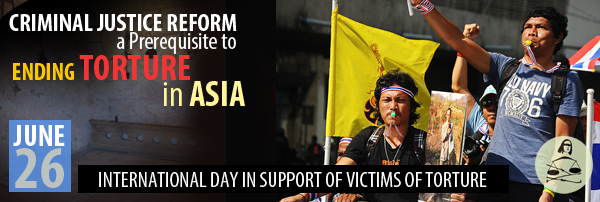June 26 is observed as the International Day in support of the victims of torture. Unfortunately, in Thailand, the day will be eclipsed by the military regime that is in power since May 2014, when it overthrew the last elected government.
The National Council for Peace and Order that is in power is military machinery. It has, since inception, actively engaged in purging voices of political as well as academic dissent on the military coup.
Practice of torture is widespread in Thailand. Those keeping a watch on human rights abuses and political movements in Thailand would still remember the ghastly video news that showed arrested persons with their arms and legs tied, forced to crawl like reptiles on a beach, to make their way into the military/police vehicles, as part of the then government’s crackdown on narcotic trade in Thailand. Situations have not changed since, but have, in fact, worsened.
The Asian Human Rights Commission (AHRC) has over the past 10 years documented 120 cases of torture from Thailand. Torture is committed even within court halls. For instance, an accused standing trial is brought to the court in handcuffs, and the handcuffs chained to yet another chain that is locked onto both ankles of the accused. Such treatment of suspects in open might be less severe compared to what a suspect faces inside police lockups and prisons. It is torture nonetheless. The practice also speaks to the primitive nature of the Thai legal system.
Thailand’s Judiciary is one of the least advanced in the region. It can only be compared to institutions known as the judiciary in Burma, China, Cambodia, and Vietnam. Even the Supreme Court of Thailand is not independent from interference. The Judiciary in Thailand is highly vulnerable to interference from the government, powerful politicians, the Military, and to those who can invoke a royal decree or pronouncement.
Being circumscribed by the above factors, the Judiciary, and the legal system within which the Judiciary operates, offers little help in providing redress in cases of human rights abuse. For instance, concepts like Habeas Corpus Writs are unheard of in Thailand. This means, in cases of disappearances followed by arbitrary and incommunicado detention and torture, common to the country, it is the burden of the petitioner to prove the missing person is in State custody. Thailand does not accept that it is the State’s responsibility to account for every citizen within its jurisdiction.
It is this primitive nature of the Thai legal system, and a weak Constitutional Court, that has led to 11 military coups in Thailand, since 1932. Despite 16 new constitutions since the first coup and the first Constitution, Thailand could not prevent a military dictatorship from declaring and “taking over administration of the country.” Soon after the 11th successful military coup, the National Council for Peace and Order has replaced the country’s Judiciary with Military Courts, practically for all purposes concerning fundamental human rights and freedoms.
Every case of torture must be investigated, and tried in a civilian court. In Thailand it is not even remotely possible since the National Council for Peace and Order has ousted the jurisdiction of the civilian courts for all matters relating to complaints against the state. Even if the martial law is lifted, the courts in Thailand are immature in their understanding of the seriousness of the crime and about the state’s responsibility to end it.
It is in the context of an immature justice administration system that custodial violence like torture should be analysed and understood in Thailand. Today, no one can safely complain against torture or other inhuman or degrading treatment in Thailand. In fact, no one can even freely speak or express opinion in Thailand. Communications are monitored under the martial law and there is no more free press in the country. The military regime has sunk its teeth deep into the Thai social fabric; even lectures in colleges and universities are forced to meet standards that the martial law has put in place.
It is an anomaly and equally a shame that despite the martial law continuing in Thailand, most international organisations, including the UN, have their Asian regional offices in Thailand, while human rights defenders, free journalists, and even freethinking academics of Thailand have to either remain silent or have left the country. Human rights defenders from foreign countries working in Thailand are offered short-term employment visas that require renewal every third or fourth month.
The international community has abandoned Thailand and its people to fate. Most agencies that speak about human rights and humanitarian aid continue business from within and without Thailand as if nothing has happened in Thailand.
It is time to stop being blind to this. The International Day in Support of Victims of Torture is an opportunity for the international community to express support and show solidarity to the people of Thailand.

For further information: In Hong Kong – Mr. Bijo Francis, email: ahrc@ahrc.asia